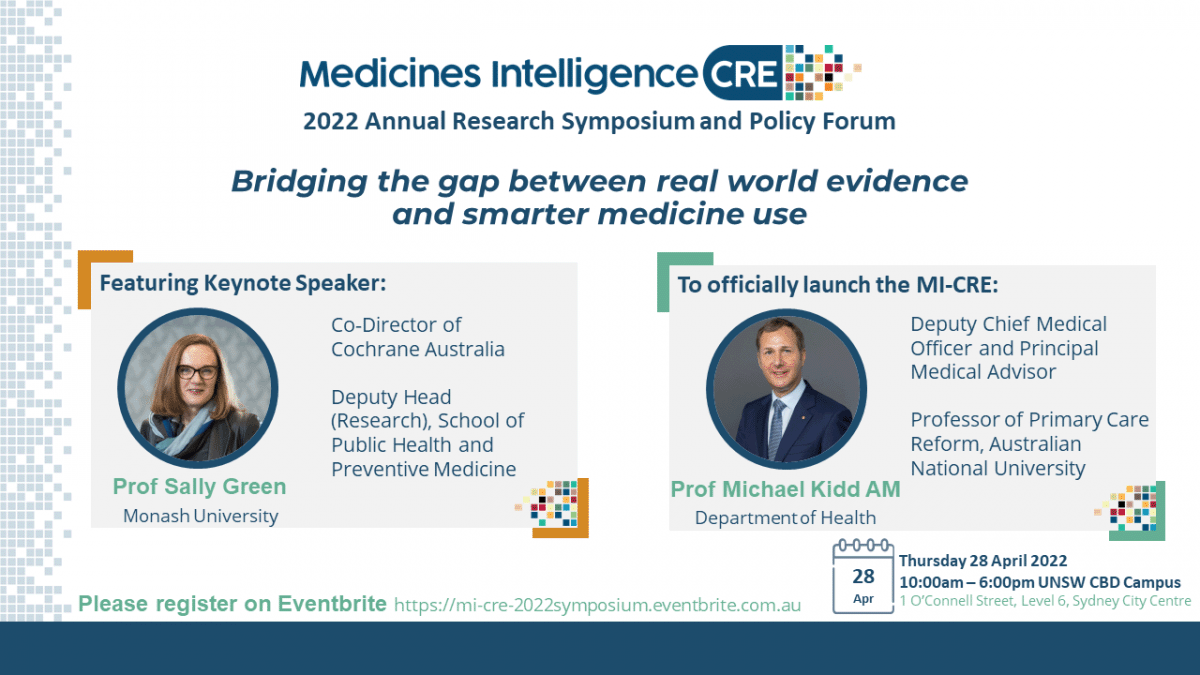
After too long in lock-down, we were excited to get together in Sydney for the MI-CRE's second Annual Research Symposium and Policy Forum.
This year the theme of the MI-CRE Annual Research Symposium and Policy Forum was all about knowledge translation:
Bridging the gap between real world evidence and smarter medicine use
The day included presentations by students, ECRs and MCRs, alongside panel discussions between academic and policy end-users on translational research.
Unfortunately this year's Keynote Presentation 'Knowledge translation: using research to strengthen health systems and improve people’s health' by Professor Sally Green had to be postponed due to illness, but will be rescheduled to a later date.
We were thrilled to finally be able to celebrate the official launch of the Medicines Intelligence CRE with Professor Michael Kidd AM, Deputy Chief Medical Officer and Principal Medical Advisor, Australian Government Department of Health.
The Symposium was open to members of the MI-CRE, consumers, our policy and translational partners, as well as anyone with an interest in bridging the gap between real world evidence and smarter medicine use.For those who couldn't attend the Symposium we have recorded the abstract sessions and provided links in the program below. We hope you can join us next year for another great MI-CRE Symposium and meetings!
- Program
- Speakers
Opening and welcome: Symposium Co-Chairs |
|
|
|
Co-chairs: Andrea Schaffer and Jacques Raubenheimer |
|
| Renly Lim |
The extent of medication-related hospital admissions in Australia: a review from 1988 to 2021
|
| Jun Ni Ho |
Mind the GAP: knowledge of biologic medicines safety at market launch
|
| Maria Aslam |
Prevalence of exposure to cardiotoxic cancer medicines in the Australian population
|
| Lan Kelly (10 mins) |
A weighting method to reduce bias in case-crossover studies
|
Abstract Session 2 – Opioid use and harms Co-chairs: Nicole Pratt and Jacques Raubenheimer Abstract Session 2 Recording - Opioid Use and Harms
|
|
Chrianna Bharat
|
|
| Ria Hopkins |
|
| Forrest Koch |
Evaluating the impact of the June 2020 changes to opioid prescribing on the PBS
|
| Erin Kelty (10 mins) |
|
Abstract Session 3 – ‘Mixed bag’ Co-chairs: Jonathan Brett and Erin Kelty Abstract Session 3 Recording - 'Mixed Bag'
|
|
| Claire Deakin |
|
| Jing Ye |
|
| Deidre Criddle |
|
| Dami Sotade |
|
Abstract Session 4 – Psychotropic medicine use and harms Co-chairs: Ximena Camacho and Erin Kelty Abstract Session 4 Recording - Psychotropic Medicine Use and Harms
|
|
| Juliana de Oliveira Costa |
Changes in antidepressant use in Australia: A nationwide analysis (2015-2021)
|
| Mouna Sawan |
|
| Jessy Lim |
|
| Kate Chitty (10 mins) |
|
Awards Professor Nicole Pratt Chief Investigator, NHMRC Centre of Research Excellence in Medicines Intelligence, University of SA Ms Chrianna Bharat PhD Candidate, UNSW and MI-CRE Symposium Organising Committee
|
|
Keynote speaker: Professor Sally Green
Professor Sally Green is Co-Director of Cochrane Australia and Deputy Head (Research) of the School of Public Health and Preventive Medicine at Monash University. She holds a PhD in Epidemiology and Preventive Medicine from Monash.
Professor Green’s research aims to improve health outcomes and strengthen health services through high quality, timely research synthesis and guideline development. Her work is focused on implementation of research into clinical practice and health policy.
Professor Green is a member of Australia’s National Health and Medical Research Council (NHMRC) Synthesis and Translation of Research Evidence (SToRE) Advisory Group and Cochrane’s international Governing Board.
Special guest speaker: Professor Michael Kidd AM
Professor Michael Kidd AM is Deputy Chief Medical Officer and Principal Medical Advisor with the Australian Government Department of Health, where he is leading Australia’s national primary care response to the COVID-19 pandemic. In 2021 he was appointed to Chair the Expert Advisory Committee leading the Review of Australia’s National Medicines Policy.
Michael is also the foundation Professor of Primary Care Reform at The Australian National University. He is a general practitioner, a past president of the Royal Australian College of General Practitioners, a past president of the World Organization of Family Doctors (WONCA), and a past Dean of the Faculty of Medicine, Nursing and Health Sciences at Flinders University.
Prior to returning to Australia to support the pandemic response by the Department of Health, he was Director of the World Health Organization Collaborating Centre on Family Medicine and Primary Care, Senior Innovation Fellow with the Institute for Health System Solutions and Innovative Care, and Professor and Chair of the Department of Family and Community Medicine at the University of Toronto in Canada.
Friday MI-CRE Methods Workshop: Quasi-experimental methods - Bridging the gap between administrative data and causal conclusions
Presented by Mr Steve Yeong and Professor Nicole Pratt
